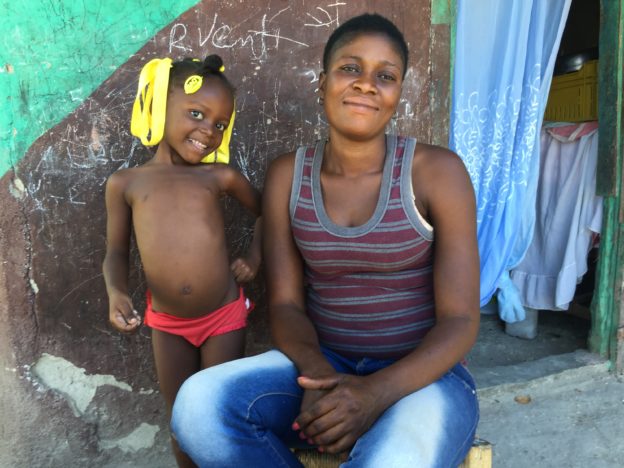I wrote a short piece about Miraclide in early 2015, just after she graduated. At the time, she was struggling to manage her small commerce. It had grown considerably since she established it with savings from her weekly cash stipend, but she was finding it hard to get her customers, who often bought on credit, to pay what they owed. For that reason, she had decided not to join the credit program offered by our sister organization, Fonkoze Financial Services. She was afraid she’d end up unable to pay back her loans if her customers’ payments were late. (See the original post here.)
Three years later, her life has really changed. Her three daughters are in school, but not at the small community school that was once all she could afford. The youngest, in her first year of kindergarten, was just a baby when Miraclide graduated from CLM. And she decided to send all three to schools down the road in Mirebalais. “The schools there are better, and education is the most important thing you do for your kids.”
She’s a single mother, but she’s lucky. The father of the two younger children helps her out. But she still is spending a lot. Just the transportation – a contract with a motorcycle taxi driver whom she trusts – is expensive. She pays 3000 gourds, or almost $50, per month for him to take the three girls to school, and then pick them up and bring them home every day. Then there are school fees, uniforms. The money their father gives – a little more than $8.25 per week for both his girls – allows her to make sure they go with a little snack in their school bags.
She still has two goats, but she sent them to her mother’s house for her family to look after them. She worries that as closely as she lives to the main road, they would always be at risk of theft. And she admits that she was never very focused on raising livestock, even when she was part of the program. Though even now, she’s planning to buy a small pig as soon as she can.
For her, getting ahead always meant starting a small commerce. When she joined the program, she was living on the 75 gourds that her girls’ father would occasionally send. She chose to receive goats and a pig when she joined the program, and she managed to increase their value a lot over 18 months, but her business was the heart of her plan for the future. By the 12-month mark, her it was worth 2000 gourds, and just five months later, when she was evaluated for graduation, it was worth 5000, which was more than $100 at the time.
She would try selling one thing after another. “I started with milk, sugar, and soft drinks, then moved to cosmetics. Whenever something didn’t work, I tried something else.” More recently, she’s sold groceries. She put her commerce aside recently when a nearby mission started some construction work. She can earn 250 gourds, or about $4 per day, hauling the water that the builders need to mix the cement, so she’s doing that for now. She’ll start selling again soon, however. She’d like to take out a loan to re-start her business on a bigger scale, but she lost her government ID a few years ago when someone picked her pocket, and worries that she wouldn’t be able to get a loan without one.
But her biggest problem when she joined the program, and the area of her greatest progress as well, has to do with her home. When she joined the program, she was living in a rented room. She had reached the point at which she could no longer pay for it, and her landlord wanted her out. She didn’t know where she might go.
Shortly after she joined the program, she was able to find a plot of land nearby to rent. Her case manager helped her get a signed, five-year lease. The lease is critical. As we have learned from our interviews with graduates over the years, their progress is unreliable if their access to the land they live on is not assured.
Miraclide built a simple, two-room home for herself and her girls. Its walls were woven out of sticks that the builders covered with mud, but it had a good roof of new tin, so she and the kids were dry and comfortable. As her business grew after graduation, she invested more in the house, replacing the walls of sticks with more solid ones of cinder blocks and cement.
But she still wasn’t satisfied. She spoke to her landlord about his willingness to let her stay on the land long-term. Her lease is up in 2018. He told her that he wasn’t planning to sell the land and that she could continue to rent. He promised that if he does decide to sell, he’ll offer the land to her first. It’s a good plot, with two large mango trees, that provide her a saleable harvest every year. With her place secure, she started building a new, larger house. She isn’t finished yet, but the walls are almost complete, and soon she be able to add the roof.
As hard as she’s worked to get the house near to completion, she gives a lot of the credit to CLM. But she doesn’t talk about the livestock she received or the cash stipend that helped her get her business started. “Before CLM, I didn’t know how to manage what I had. That’s what I learned. I don’t know what other people say, but CLM did a lot for me.”
